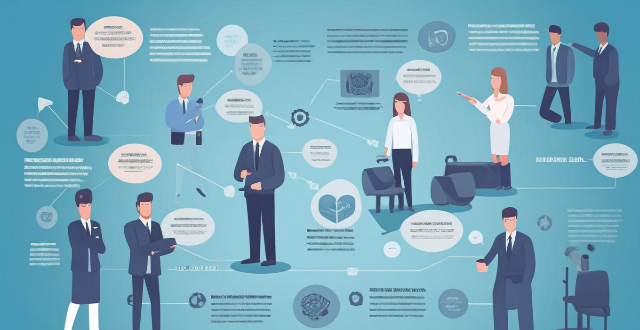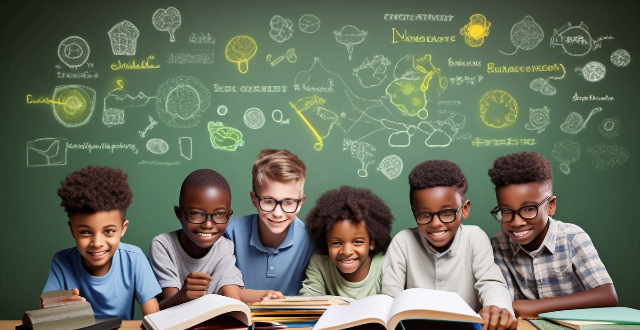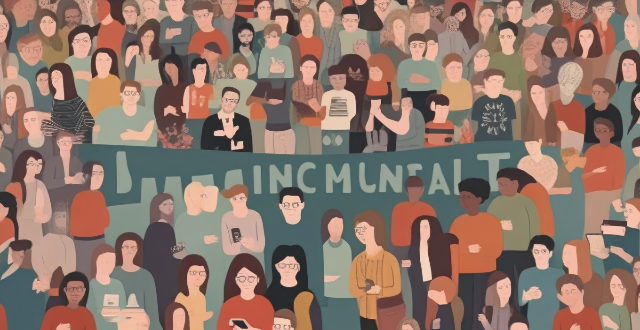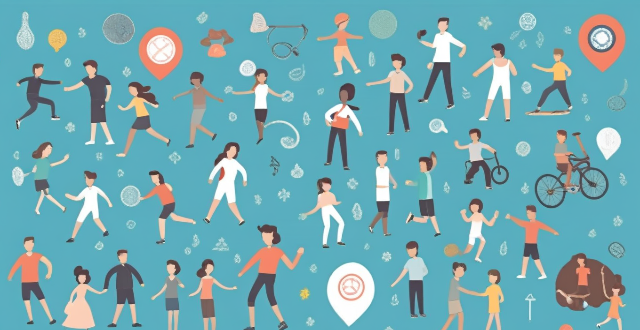Discrimination Society

How do inclusive policies benefit society as a whole ?
Inclusive policies are designed to promote equality, fairness, and social cohesion by eliminating barriers and discrimination. These policies benefit society as a whole by ensuring equal access to resources, services, and opportunities for all individuals regardless of their background, abilities, or circumstances. In addition to promoting equality and fairness, inclusive policies also enhance social cohesion by fostering a sense of belonging and mutual respect among different groups within society. This leads to reduced discrimination, increased tolerance, and strengthened community bonds. Inclusive policies also have positive economic outcomes by expanding the talent pool, reducing poverty, and stimulating consumer spending. Furthermore, these policies foster innovation and creativity by providing diverse perspectives, encouraging risk-taking, and promoting collaboration. Finally, inclusive policies can enhance a country's global competitiveness by attracting talent, improving international relations, and driving economic growth.

How can multicultural education help reduce racial and ethnic discrimination ?
Multicultural education is crucial in combating racial and ethnic discrimination. It fosters cultural awareness, intercultural competence, challenges biases, promotes social justice, builds inclusive communities, and prepares global citizens. By doing so, it helps reduce discrimination and creates a more equitable and harmonious society.

How can we promote diversity and inclusion in a multicultural society ?
This topic discusses strategies to promote diversity and inclusion in a multicultural society, including education, legislation, community engagement, media representation, business leadership, and personal actions.

Has religion ever been used to justify discrimination in sports ?
Religion has been used to justify discrimination in sports, including apartheid in South Africa, Islamic veiling and swimming, and caste-based discrimination in India. Contemporary issues include Sikh turbans and safety regulations, and Jewish holidays and scheduling conflicts. Addressing these issues requires a balance between respect for religious freedom and principles of equality and fairness in sports.

What legal resources are available for women who face discrimination or abuse ?
This text provides a summary of legal resources available to women who are facing discrimination or abuse. It outlines various government agencies that enforce laws related to gender-based discrimination and violence, non-governmental organizations that offer support and information, legal aid organizations that provide free or low-cost legal services, and online resources that offer legal information and self-help guides. The text emphasizes the importance of seeking help from these sources if one is experiencing any form of mistreatment or inequality based on their gender.

What are the long-term effects of poor immigrant integration on society ?
This article discusses the long-term effects of poor immigrant integration on society, including social exclusion, economic consequences, and cultural impacts such as loss of cultural heritage and increased tensions between ethnic groups. It emphasizes the importance of prioritizing immigrant integration efforts to ensure that immigrants are fully included in all aspects of society.

How can women protect themselves from gender-based discrimination and harassment ?
Gender-based discrimination and harassment are pervasive issues that women face in various settings, including the workplace, education, and public spaces. To protect themselves, women can take several proactive steps to ensure their safety and well-being, including educating themselves about their rights and forms of harassment, creating a supportive network, taking preventive measures, reporting incidents promptly, seeking legal advice and counseling services when needed, and advocating for change by raising awareness and participating in policy making. By employing these strategies, women can better protect themselves from gender-based discrimination and harassment while also contributing to a broader cultural shift towards equality and respect.

How can sports organizations work to address issues of discrimination and exclusion within their own communities ?
Strategies for sports organizations to address discrimination and exclusion include creating diverse leadership teams, implementing anti-discrimination policies, promoting inclusive language and culture, fostering open communication, educating members about inclusivity, and collaborating with other organizations.

What are the benefits of social inclusion for individuals and society as a whole ?
Social inclusion benefits individuals and society by promoting equality, diversity, and participation. Individuals experience enhanced quality of life, greater opportunities, improved mental health, increased self-esteem, and strengthened social support networks. Society benefits from economic growth, reduced poverty and inequality, improved public services, enhanced social cohesion, increased civic engagement, promotion of human rights, a positive global image, and intergenerational equity.

How does scientific literacy among women impact society ?
Scientific literacy among women has significant benefits for society, including improved health outcomes, increased economic opportunities, enhanced environmental stewardship, greater participation in policy decisions, and promotion of gender equality. However, challenges such as lack of access to quality education, gender biases in STEM fields, limited role models, and workplace discrimination must be addressed to fully realize these benefits.

How does a multicultural society impact the education system ?
In a multicultural society, the education system is influenced in various ways. One of the most obvious impacts is diversity in classrooms which can enrich the learning environment and help students develop empathy and understanding for people who are different from themselves. The curriculum may need to be adapted or changed to accommodate the needs of a diverse student population. Language barriers can also be a challenge for both students and teachers. Educators need to be culturally sensitive and aware of the diverse backgrounds of their students. Parental involvement in education can be complex in a multicultural society. By embracing diversity in the classroom, the education system can create an inclusive and enriching learning environment for all students.

What are the challenges of living in a multicultural society and how can they be overcome ?
Living in a multicultural society presents challenges like language barriers, cultural differences, and social isolation. Overcoming these involves strategies such as education, celebrating diversity, fostering inclusivity, building intercultural competence, and supporting identity development.

What are the positive effects of celebrity influence on society ?
Celebrities wield significant influence that extends beyond their areas of expertise, and this influence can have both positive and negative impacts on society. The positive effects include raising awareness on important issues, promoting education, cultural exchange, economic growth, sustainable living, fashion trends, and driving social change through activism. Celebrities can use their platforms to bring attention to global concerns, promote healthy lifestyles, encourage mental health discussions, support literacy programs, inspire STEM pursuits, showcase cultural diversity, boost local businesses, foster entrepreneurship, advocate for eco-friendly practices, diversify beauty standards, engage in political conversations, and strengthen community bonds. However, with great influence comes great responsibility; celebrities should strive to use their platform thoughtfully and constructively for the betterment of society.

What are the advantages and disadvantages of living in a multicultural society ?
Advantages and Disadvantages of Living in a Multicultural Society The advantages of living in a multicultural society include cultural diversity, enhanced understanding and tolerance, economic benefits, language learning, and social inclusivity. These benefits enrich daily life by exposing individuals to different ways of thinking, art forms, cuisines, and festivals, fostering greater understanding and acceptance of others, attracting a skilled global workforce, providing natural opportunities to learn new languages, and promoting better access to education, healthcare, and other social services for all members of the community. However, living in a multicultural society also has its disadvantages, such as cultural conflict, integration challenges, identity confusion, potential for segregation, and policy challenges. Differences in cultural values and norms can sometimes lead to misunderstandings and conflicts, newcomers might face challenges integrating into the mainstream culture, individuals may struggle with their sense of identity, communities might form based on shared ethnicity or language reducing interaction between different groups, and managing a multicultural society requires complex policy-making to address the needs of diverse populations. Overall, living in a multicultural society requires thoughtful management and open-mindedness to navigate the complexities of diverse populations successfully while enjoying the benefits it brings.

How can we celebrate and embrace cultural differences in a multicultural society ?
In a multicultural society, celebrating and embracing cultural differences is crucial for fostering understanding, respect, and harmony. To achieve this, it's important to educate oneself and others about different cultures, participate in cultural events, promote diversity in media and entertainment, advocate for inclusivity in education and workplaces, engage in open dialogue, practice empathy and active listening. These strategies can help create a more inclusive and harmonious multicultural society where everyone feels valued and respected for their unique cultural contributions.

What role do sports play in promoting diversity and inclusion in society ?
The text discusses the various ways in which sports can contribute to promoting diversity and inclusion. This includes breaking down stereotypes and prejudices, highlighting achievements of underrepresented groups, providing equal opportunities, fostering cultural exchange, encouraging respect and fair play, and promoting health and wellness for all. It emphasizes that sports serve as a powerful vehicle for promoting diversity and inclusion in society by breaking down barriers, providing equal opportunities, fostering cultural exchange, encouraging respect and fair play, and promoting health and wellness for all.

How does cultural fusion affect society's development ?
Cultural fusion is the process whereby different cultures influence each other over time. This phenomenon can have a significant impact on society's development in various ways. In this article, we will explore how cultural fusion affects society's development and discuss some examples of its effects. One of the most obvious benefits of cultural fusion is that it enhances diversity within a society. When different cultures come together, they bring with them unique perspectives, traditions, and values that can enrich the overall culture. This can lead to increased creativity, innovation, and social progress. Another benefit of cultural fusion is that it promotes tolerance and understanding among people from different backgrounds. By learning about and experiencing other cultures, individuals become more open-minded and accepting of differences. This can help to reduce prejudice, discrimination, and conflict within society. Cultural fusion also plays a crucial role in facilitating globalization. As cultures interact and exchange ideas, goods, and services, they become more interconnected and interdependent. This can lead to increased economic growth, trade opportunities, and international cooperation. While cultural fusion can bring many benefits to society, it also presents some challenges that must be addressed. These include loss of cultural identity, erosion of cultural heritage, and cultural imperialism. There are many examples of cultural fusion throughout history and around the world today. Some notable examples include food culture, music culture, and fashion culture.

What role do governments play in promoting cultural understanding and acceptance in a multicultural society ?
Governments can promote cultural understanding and acceptance in multicultural societies by implementing policies and programs that foster diversity, inclusion, and respect for different cultures. They can launch education and awareness campaigns, enact legislation and policies, engage with communities and partner with NGOs, and promote international cooperation to create an environment where diversity is celebrated, respected, and embraced.

How can writers use sports as a metaphor for larger societal issues ?
The text provides a guide on how writers can use sports as a metaphor to explore larger societal issues. The playing field in sports is likened to a microcosm of society, where fairness, equality, and justice are examined. Teamwork and collaboration in sports are used to discuss cooperation, diversity, and inclusion in society. The competitive nature of sports serves as a metaphor for the drive for success, ambition, perseverance, and the cost of success. Rules and ethics in sports are compared to societal laws and ethical standards, discussing corruption, cheating, and the importance of maintaining integrity. Finally, overcoming adversity in sports is used as a platform for stories of hope and resilience in the face of societal challenges.

Can you explain the concept of intersectionality as it relates to women's rights ?
Intersectionality is a term used to describe the interconnectedness of various forms of oppression and discrimination, including race, gender, sexuality, class, ability, and other factors. It recognizes that individuals can experience multiple forms of discrimination simultaneously, and acknowledges that not all women have the same experiences or face the same challenges. Intersectionality advocates for an approach that takes into account all aspects of a person's identity and experiences, recognizing and addressing the ways in which different forms of discrimination overlap and intersect. This concept is important for understanding and addressing women's rights because it recognizes the diversity of women's experiences and the need for a nuanced approach to advocacy and policy-making.

In what ways does education empower women socially and politically ?
Education is crucial for women's empowerment, enabling them to challenge societal norms and contribute more fully to society. It fosters increased awareness, improved socioeconomic status, and enhanced social relationships. Education also leads to greater political participation, policy influence, and promotion of gender equality. Overall, education enriches society by improving the lives of women and contributing to a more equitable world.

What impact do inclusive policies have on minority groups and marginalized communities ?
Inclusive policies have a significant impact on minority groups and marginalized communities, promoting equality, diversity, and fairness in society. These policies improve access to education and employment opportunities, increase representation in government and decision-making processes, reduce discrimination and harassment, and improve health outcomes for these communities. Overall, inclusive policies help ensure that all individuals have equal opportunities to participate in all aspects of life.

How does educational equity relate to social justice ?
Educational equity and social justice are interconnected concepts that aim to create a fair and just society. Educational equity involves providing equal opportunities for learning and addressing disparities in resources, funding, and support services between schools or communities. Social justice encompasses policies and practices that ensure everyone has equal rights, opportunities, and access to resources while eliminating discrimination based on various factors. The relationship between educational equity and social justice includes addressing systemic inequalities within the education system, providing access to quality education for all students, promoting diversity and inclusion, and empowering students to become agents of change in their communities. By achieving educational equity, we can work towards creating a more just and equitable society.

What are the challenges to achieving educational equity ?
Educational equity is a critical issue in modern society, but achieving this goal is not without its challenges. Some of the major obstacles that hinder the progress towards educational equity include limited resources, socioeconomic disparities, systemic racism and discrimination, and lack of parental involvement. It is essential for policymakers, educators, and communities to work together to develop strategies that promote equal access to quality education for all students.

What role does education play in helping immigrants integrate into society ?
Education is crucial for immigrants' integration into society, providing language skills, cultural understanding, access to opportunities, and social networking.

What is social inclusion and why is it important ?
Social inclusion refers to the process of ensuring that all individuals can participate in all aspects of society. It aims to create a society where everyone feels valued, regardless of their background. Key elements include equal opportunities, non-discrimination, participation, empowerment, and solidarity. Social inclusion is important for promoting equity and fairness, enhancing economic growth, improving health and well-being, reducing poverty and exclusion, enhancing social cohesion, and supporting sustainable development.

How does social inclusion relate to diversity and multiculturalism ?
The article discusses the relationship between social inclusion, diversity, and multiculturalism. It defines each concept and explains their importance in promoting equality, participation, and belonging. The article also highlights the benefits of diversity and multiculturalism, such as enhanced creativity and understanding among different cultural groups. The intersectionality of these concepts is explored, along with examples of inclusive policies and practices. Education is emphasized as a crucial tool for promoting social inclusion, diversity, and multiculturalism. Overall, the article concludes that these interconnected concepts are essential for building a more equitable and harmonious society.

What are the long-term effects of educating girls on society ?
The long-term effects of educating girls are numerous and far-reaching. They include improved health outcomes, economic growth, gender equality, and social change. Educated women are more likely to seek prenatal care, give birth in a medical facility, and utilize family planning methods, leading to a reduction in maternal mortality rates and infant mortality rates. Additionally, educated women are more likely to participate in the labor force, start their own businesses, and earn higher wages, leading to economic growth. Educating girls also promotes gender equality by challenging traditional gender roles and demanding equal treatment in all aspects of life. Finally, educating girls can lead to social change by breaking the cycle of poverty and promoting policies that benefit all members of society.

Why is sustainable investing important ?
Sustainable investing is crucial for the future of our planet and society. It considers environmental impact, social responsibility, long-term returns, risk management, and ethical considerations of companies. By investing in sustainable companies, investors can help combat climate change, create a more equitable society, and achieve long-term financial returns. Sustainable investing also aligns with many people's personal values and ethics.

What role do sports stars and influencers have in promoting social inclusion and diversity ?
The role of sports stars and influencers in promoting social inclusion and diversity is significant. They break down barriers by enhancing visibility and representation of diverse groups, serve as positive role models, promote inclusive practices in sports, and drive social change through collaborations and partnerships. Their actions help create an accepting and inclusive society where everyone feels valued and respected regardless of their background or identity.